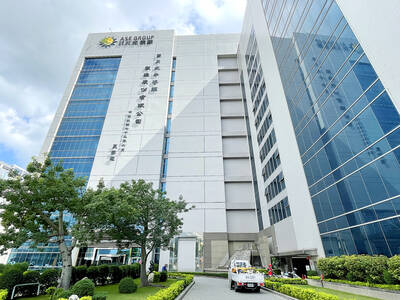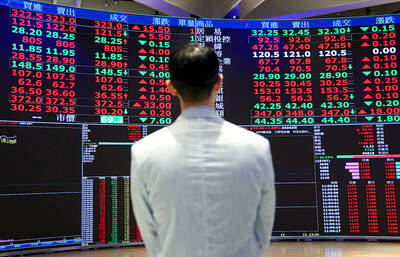Land Bank of Taiwan’s (土地銀行) initial public offering (IPO) will bring in strategic alliance partners to help the state-owned bank expand and compete with rivals, Minister of Finance Lee Sush-der (李述德) said.
The ministry is considering strategic partners with advanced management know-how and financial expertise, but will not give up management control of the bank.
“The government will retain its controlling stake in the bank,” Lee told the Taipei Times by telephone on Friday.
The ministry’s decision to launch an IPO of the state bank came after the Cabinet last week approved a special spending program of NT$100 billion (US$3.03 billion) over the next three years to help rebuild areas hit by Typhoon Morakot.
Morakot devastated the southern part of Taiwan two weeks ago, causing NT$14.43 billion in agricultural losses, substantial damage to infrastructure and the tourism sector in the area, as well as hundreds of deaths.
The ministry plans to sell a 40 percent stake in the lender — the nation’s fourth-biggest by asset value and one that possesses huge real estate properties — to help finance typhoon-related reconstruction work, Lee said.
The ministry intends to raise NT$40 billion from selling bank stocks, which are valued at NT$40 per share, while the remaining NT$60 billion will come from loans, he said.
The 63-year-old lender, 100 percent owned by the government, had a net value of NT$103.4 billion in the first quarter of the year. It has 142 domestic branches, an offshore banking unit and five branches and offices overseas, with 5,800 employees on its payroll.
The ministry is also considering selling shares to the bank’s employees and the general public, but Lee said the government did not intend to privatize the bank through the proposed IPO.
The bank’s union had voiced strong objection to the planned IPO, arguing in a statement on Thursday that it made more sense for the ministry to borrow the entire reconstruction fund from government-run banks free of interest.
The union said the land bank contributes NT$8 billion a year to state coffers and the government should hold onto its stake, denying business groups or Chinese capital the opportunity to take the lender.
Lee said the ministry would press ahead with the share sale, which will not affect the rights or benefits of the bank’s workers in any fashion.
“The ministry will talk to them and seek their understanding,” he said.
As the government also aims to sell a 10-percent stake in Taiwan Financial Holding Co (台灣金控) sometime next year, a share sale in Land Bank of Taiwan will leave the Export-Import Bank of the Republic of China (中國輸出入銀行) as the sole fully government-owned lender.

EXPANSION: The investment came as ASE in July told investors it would accelerate capacity growth to mitigate supply issues, and would boost spending by 16 percent ASE Technology Holding Co (ASE, 日月光投控), the world’s biggest chip assembly and testing service provider, yesterday said it is investing NT$17.6 billion (US$578.6 million) to build a new advanced chip packaging facility in Kaohsiung to cope with fast-growing demand from artificial intelligence (AI), high-performance-computing (HPC) and automotive applications. The new fab, called K18B, is to commence operation in the first quarter of 2028, offering chip-on-wafer-on-substrate (CoWoS) chip packaging and final testing services, ASE said in a statement. The fab is to create 2,000 new jobs upon its completion, ASE said. A wide spectrum of system-level chip packaging technologies would be available at

Taiwan’s foreign exchange reserves hit a record high at the end of last month, surpassing the US$600 billion mark for the first time, the central bank said yesterday. Last month, the country’s foreign exchange reserves rose US$5.51 billion from a month earlier to reach US$602.94 billion due to an increase in returns from the central bank’s portfolio management, the movement of other foreign currencies in the portfolio against the US dollar and the bank’s efforts to smooth the volatility of the New Taiwan dollar. Department of Foreign Exchange Director-General Eugene Tsai (蔡炯民)said a rate cut cycle launched by the US Federal Reserve

HEAVYWEIGHT: The TAIEX ended up 382.67 points, with about 280 of those points contributed by TSMC shares alone, which rose 2.56 percent to close at NT$1,400 Shares in Taiwan broke records at the end of yesterday’s session after contract chipmaker Taiwan Semiconductor Manufacturing Co (TSMC, 台積電) hit a fresh closing-high amid enthusiasm toward artificial intelligence (AI) development, dealers said. The TAIEX ended up 382.67 points, or 1.45 percent, at the day’s high of 26,761.06. Turnover totaled NT$463.09 billion (US$15.22 billion). “The local main board has repeatedly hit new closing highs in the past few sessions as investors continued to embrace high hopes about AI applications, taking cues from a strong showing in shares of US-based AI chip designer Nvidia Corp,” Hua Nan Securities Co (華南永昌證券) analyst Kevin Su

Nvidia Corp’s major server production partner Hon Hai Precision Industry Co (鴻海精密) reported 10.99 percent year-on-year growth in quarterly sales, signaling healthy demand for artificial intelligence (AI) infrastructure. Revenue totaled NT$2.06 trillion (US$67.72 billion) in the last quarter, in line with analysts’ projections, a company statement said. On a quarterly basis, revenue was up 14.47 percent. Hon Hai’s businesses cover four primary product segments: cloud and networking, smart consumer electronics, computing, and components and other products. Last quarter, “cloud and networking products delivered strong growth, components and other products demonstrated significant growth, while smart consumer electronics and computing products slightly declined,” compared with the